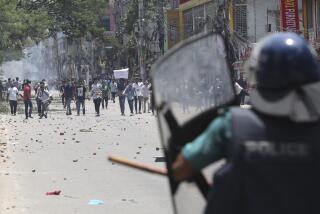Sarajevo Curfew Dims Night Life
- Share via
SARAJEVO, Bosnia-Herzegovina — At the stylish Old Fox Bar, the music blares, the conversation roars and a busy waiter juggles drinks.
Suddenly a group of teenagers hurries to finish cups of tea and coffee. The girls pull on coats and leave. At another table, three young men down the last of their beers. One checks his watch. “It’s time.” They too rush into the cold night.
In Sarajevo, the young and fashionable also have to be punctual.
The war ended a year ago, but here in the Bosnian capital and several other cities, an 11 p.m. curfew remains in force. The Serbs and the Croats, who control other parts of Bosnia-Herzegovina, have long since lifted wartime curfews, but Muslim authorities continue to clamp down.
The officials say that requiring everyone to be home by 11 p.m. helps keep the streets safe--although the streets are increasingly unsafe because of a wave of common crime.
Paranoid authorities, many of whom are products of a Communist regime, are also clearly interested in maintaining control over society. Some critics accuse the government of trying to impose moralistic prohibitions in cities that were cosmopolitan before the war--at least in Sarajevo’s case.
“The curfew will be lifted when the immediate war threat [against Bosnia] is lifted,” Interior Minister Avdo Hebib said. “It is a measure for the security of our citizens.”
Even the government seems to realize the measure is a bit harsh, and manages to suspend the curfew periodically. Holidays observed by the various religions represented here--Islam, Roman Catholicism, Orthodox--are exempt from the curfew.
*
On one recent night it was lifted for U.S. Marines Day. Then it was suspended for a poetry marathon and again for a visiting trade show of rubber products. All cultural events sponsored by the ruling Muslim political party, the Party for Democratic Action, earn suspension of the curfew.
Some Sarajevans approve of the curfew because they believe that it keeps their children out of trouble. But there is a growing chorus of intellectuals, civil libertarians and others speaking up against the measure, called in the local language policijski sat, or “police hour.”
The monthly newsmagazine Dani fights the cause in a regular series titled “The Land of the Eternal Curfew.” In this month’s edition, it published a tongue-in-cheek letter to Biljana Plavsic, the president of Serb-controlled Bosnia, soliciting her help in influencing the Muslim authorities to lift the curfew.
“In your republic, freedom of movement lasts 24 hours a day,” the letter said. “And in ours, only until 11 p.m.”
Dani suggests the curfew is an ideological tool used by hard-line Muslim nationalists in the government to further the “ruralization” and social retardation of Sarajevo.
“The curfew is becoming an instrument for . . . the ruling political and religious elite to impose its ideological will,” Dani said.
One radio editorial complained that Bosnia was following “some Latin American recipe” whereby dictatorial curfews are mandated, and yet crime soars anyway. The criminals, it said, are seemingly oblivious to the curfew.
Plenty of people ignore the deadline. That used to land a fair number in jail--more than 11,000 in the first six months of this year, according to Dani. But now a confrontation with a police officer more likely results in a fine of about $20, payable on the spot.
People who perform a “valuable” service, such as cab drivers or bread bakers, are exempt from the curfew. Some bars and restaurants with connections and special permits are allowed to continue operating after 11 p.m. And their patrons are similarly free from harassment.
*
At the Old Fox Bar on a recent Friday night, manager Ervan Colic said the curfew “has a certain charm to it,” even if it hurts business.
But a 22-year-old man with three earrings in his right ear finished his beer and shrugged his shoulders when asked about the curfew. “I don’t get it,” he said, and headed for the door.
More to Read
Sign up for Essential California
The most important California stories and recommendations in your inbox every morning.
You may occasionally receive promotional content from the Los Angeles Times.













